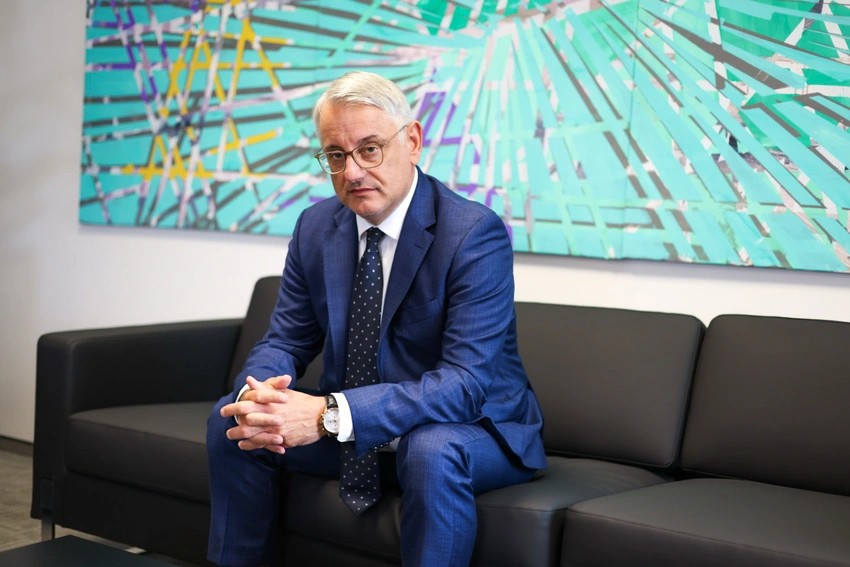Slovenian minister: Azerbaijan may become key partner for EU in digital technologies - INTERVIEW
- 27 October, 2025
- 13:51

Slovenia and Azerbaijan are two countries located at the heart of Europe and the crossroads of Asia. They are striving not only to strengthen political and cultural ties but also to expand economic cooperation. Recent years have seen a significant increase in trade turnover, intensified contacts between business circles, and the development of joint initiatives in energy, innovation, and tourism.
Particular attention is paid to sustainable development, digitalization, green technologies, and the expansion of transport links within the Middle Corridor, where Azerbaijan plays a strategic role.
In an exclusive interview with Report, Matjaž Han, Minister of Economy, Tourism, and Sport of the Republic of Slovenia, discussed the prospects for bilateral partnership, new areas of cooperation, and Slovenia's potential in the green transition.
Report presents the interview:
- How would you characterize the current state of economic relations between Slovenia and Azerbaijan? Which areas of cooperation are currently developing most actively, and where, in your opinion, does untapped potential still remain - in trade, investment, innovation, or industry?
- Slovenia and Azerbaijan are building on traditionally good relations with an increasing emphasis on deepening economic cooperation. Slovenia is a stable, export-oriented economy, where 85% of manufactured goods and services are exported, with the key players being innovative small and medium-sized enterprises as well as successful large companies in pharmaceuticals, the automotive industry, ICT, renewable energy sources and agricultural mechanization.
Currently, cooperation is strengthening most rapidly in logistics, the development of efficient transport routes (e.g. cooperation of Slovenian companies in Baku), energy, digitalization and the pharmaceutical sector. However, there remains considerable untapped potential in direct investments, innovations, joint presence in third markets and cooperation in high-tech industries, where the partnership can be significantly deepened alongside the country.
The visit of the Slovenian Minister of Foreign and European Affairs, H.E. Tanja Fajon, to Azerbaijan in April this year, undertaken at the invitation of Foreign Minister Jeyhun Bayramov, was accompanied by a strong economic delegation. On this occasion, the first meeting of the Working Group for Economic Cooperation was held. This meeting, together with the business delegation's visit, provided significant impetus for strengthening bilateral economic ties, including in the energy sector.
We are particularly pleased with the positive trend in economic cooperation. In 2024, trade in goods increased by 57% to 37.7 million euros. We also highlight our excellent cooperation in the pharmaceutical industry, where leading Slovenian companies such as Krka and Sandoz are already well established in the Azerbaijani market. The positive trend continues in 2025 as well.
The total value of trade in the first eight months of 2025 amounted to 43.1 million euros (+63%), primarily due to a significant 167% increase in imports from Azerbaijan, which reached 24.5 million euros. Mineral fuels and oils accounted for 58% of this value, which is the result of the activities carried out in this area so far. During the same period, Slovenian exports totaled 18.6 million euros (+8%). During the same period, Slovenian exports totaled 18.6 million euros (+8%).

During his visit to Baku in April this year, the Minister of Environment, Climate and Energy, Mr. Bojan Kumer, signed a Memorandum of Understanding on Cooperation in the Field of Energy. This Memorandum represents an important step toward strengthening energy security and reflects the mutual interest of both countries' companies and industries in advancing cooperation, particularly in the fields of gas supply and sustainable energy development.
We also see opportunities for enhanced cooperation in innovation, technology, and sustainable development.
Slovenia has already supported a development project in Azerbaijan through UNIDO, the Development of the Innovation Ecosystem and Support initiative, and through ITF Enhancing Human Security, which has been cooperating with Azerbaijan's National Agency for Mine Action (ANAMA) since 2002 on mine action, conventional weapons destruction, and rehabilitation projects.
- Is a meeting of the Joint Working Group on Economic Cooperation between our countries planned in the near future? Is there a possibility of your visit to Azerbaijan to discuss new forms of interaction, including agreements in the fields of investment, logistics, or tourism?
- Joint Working Group (JWG) meetings are usually organized every 1-2 years, depending on the dynamics of relations and activities between countries. With Azerbaijan hosting the 1st session of JWG in Baku in April 2025, Slovenia would be the next host. Depending on other activities, JWG could take place sometime in 2026. An additional visit or official delegation from the Ministry of Economy, Tourism, and Sports to Azerbaijan is not foreseen at the moment.
- How do you assess the prospects of Slovenia's participation in the development of the Middle Corridor as part of the pan-European logistics strategy? In your view, what role does Azerbaijan play in ensuring connectivity between Europe and Asia, and are there already negotiations on possible joint projects?
- The Middle Corridor is primarily a rail and road connection, with smaller maritime segments across the Caspian and Black Seas. According to available information, the Koper Cargo Port does not record direct cooperation with Azerbaijani ports, and joint maritime projects are not known. There is no available information on the participation of other Slovenian companies in the region.

- How do you evaluate the potential opening of the Zangazur Corridor (TRIPP) in terms of its impact on the routes of the Middle Corridor and the overall logistics map of the region? Could this change the balance of cargo flows, including the role of Black Sea and Ukrainian ports?
- Given the expected increase in throughput across the Central Corridor, opportunities may arise in the long term for so-called short-sea shipping connections and intermodal solutions between the Black and Adriatic Seas, as well as potential cooperation in the field of digitalization and automation of port processes.
- Is Slovenia considering participation in infrastructure initiatives related to the Zangazur route and the development of transit links between the Caspian, the South Caucasus, and Europe? Or at this stage, is it more about monitoring geopolitical processes and assessing economic feasibility?
- Regarding the Zangazur Corridor, the Ministry of Infrastructure, Directorate for Air and Maritime Transport - Maritime Sector cannot assess the impact on the transshipment flows of the Middle Corridor and Black Sea ports, nor do we have information on direct participation in infrastructure initiatives.
- Is Slovenia negotiating with Azerbaijan to increase the number of flights between our countries or to launch a direct route between Baku and Ljubljana? In your opinion, how much could this contribute to the development of business and tourism ties?
- There are no scheduled air services between the Republic of Slovenia and Azerbaijan. Negotiations between the two countries on an air transport agreement are still ongoing. However, we agree that scheduled air services enable general economic cooperation between the countries.
- What steps is Slovenia taking to attract tourists from Azerbaijan? Which areas - wellness, skiing, cultural, or eco-tourism - do you consider the most promising for joint promotion? Is the possibility of holding tourism roadshows or joint campaigns in Baku being considered?
- The Slovenian Tourist Board and some tourist companies participated in a tourism workshop in Baku in April 2025, as well as in April 2024. In Slovenia, the organization of B2B events, study tours for tour operators, journalists and influencers is carried out by the Slovenian Tourist Board. We propose that the Slovenian Tourist Board and the State Tourism Agency of Azerbaijan get together to cooperate in the organization of study trips for journalists, influencers and tour operators from both countries.
Our strongest promotional areas in Azerbaijan are wellness/natural SPAs, culture/Cultural heritage, gastronomy, outdoor, nature experiences.

- Is the creation of joint ventures between Slovenian and Azerbaijani companies being considered? In which sectors (energy, pharmaceuticals, mechanical engineering, green economy) do you see the greatest potential? DIPI?
- Establishing joint ventures could be one of the forms of economic cooperation between Slovenia and Azerbaijan. We see the greatest opportunities in the fields of energy (especially renewable sources and green technologies), pharmaceuticals (where numerous Slovenian innovative companies operate), mechanical and electrical engineering, as well as in digitalization and smart solutions for logistics and transport management. We also believe that joint development and knowledge transfer in the green economy open opportunities for long-term partnership.
- Slovenia is known for its achievements in environmental technologies and sustainable development. Is there interest in cooperation with Azerbaijan in such areas as renewable energy, waste management, energy-efficient solutions, or water resources?
- Slovenia is striving to strengthen cooperation in the field of the green transition, where it has extensive experience in the development and implementation of environmental technologies - from renewable energy sources to smart waste management, energy-efficient solutions for modern water resource management. We recognize cooperation with Azerbaijan in these areas as strategically important and see the greatest potential for knowledge transfer, exchange of good practices and joint projects in support of sustainable development.
Memorandum of Understanding signed between the energy ministries of Slovenia and Azerbaijan reflects our shared commitment to enhancing cooperation in renewable energy and other clean technologies, including hydrogen. We look forward to this partnership continuing and growing even stronger in the future.
- How do you assess Azerbaijan's role in the context of expanding economic relations between the European Union and the countries of the Eastern Partnership? Could Baku become one of the EU's key partners in energy, logistics, and digital technologies?
- Due to its geographical location and investments in port and railway infrastructure, Azerbaijan is rapidly consolidating its role as a key bridge between Europe and Asia. In particular, within the framework of the Central Corridor, conditions are being created for a more reliable and efficient flow of goods between China, Central Asia and the European Union.
At the same time - in our assessment - Azerbaijan has the potential to become an important partner of the EU not only in the field of energy and logistics, but also as a connector in digital technologies and smart solutions, where cooperation can be based on the exchange of best practices and innovations.
Slovenia believes that lasting peace and stability in the South Caucasus region are essential for achieving sustainable economic success and prosperity. We firmly support regional cooperation and enhanced connectivity as key drivers of development and prosperity for the region.
Slovenia strongly supports the normalization process between Armenia and Azerbaijan and emphasizes the crucial role of the European Union in promoting confidence-building measures and initiatives that foster lasting peace, economic growth, and regional integration. We will continue to support all constructive efforts aimed at building a peaceful, secure, and economically vibrant South Caucasus.
